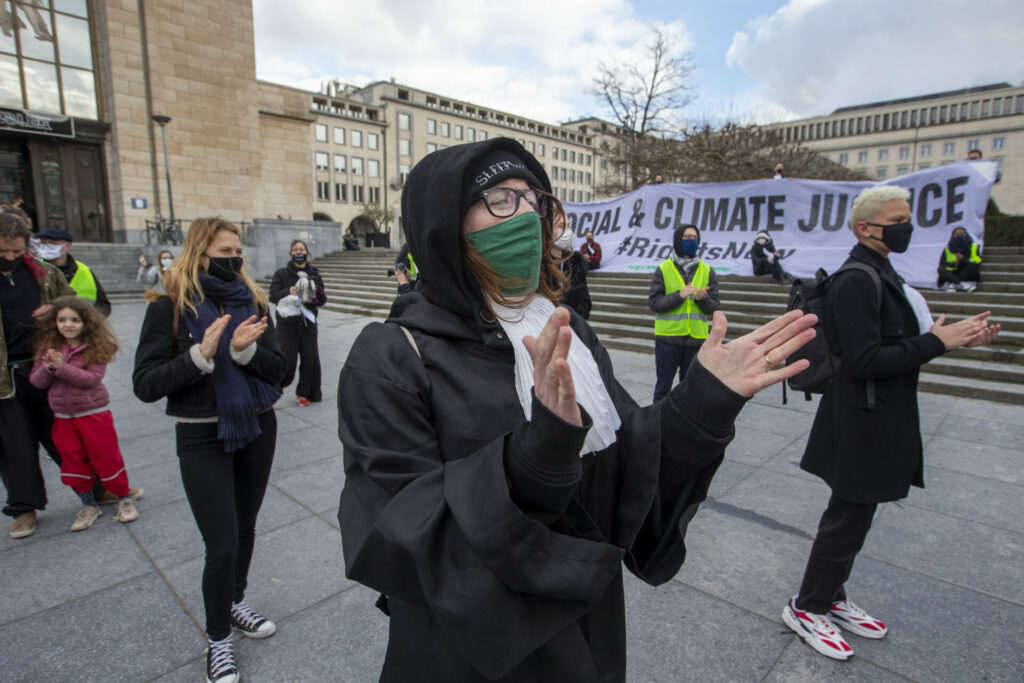The Belgian State, the Flemish Region, and the Brussels-Capital Region have all been condemned by the Brussels Court of Appeal on Thursday for not having made sufficient efforts to reduce greenhouse gas emissions.
The non-profit organisation Klimaatzaak ("Climate case" in Dutch) went to court in 2015 along with 58,586 co-plaintiffs to force the Belgian authorities to honour the promises made to reduce greenhouse gas emissions.
Already in 2021 the French-speaking court of first instance in Brussels ruled that the Belgian authorities had been negligent in their climate policies and that Belgian environmental policies violated the legal duty of care and human rights.
However, the court did not impose measures to reduce greenhouse gas emissions on the Belgian State and regions, leading Klimaatzaak to appeal. The Brussels Court of Appeal has now ruled that the Belgian State, the Flemish Region, and the Brussels-Capital Region were indeed at fault.
Not taking sufficiently far-reaching measures
"The court finds that, in the light of the prevailing consensus within the scientific community and the international political community, the three governments violated Articles 2 and 8 of the European Convention on Human Rights (ECHR) and Articles 1382 and 1383 of the Old Civil Code by failing to sufficiently reduce greenhouse gas emissions by 2020," said press magistrate Anne Leclerc.
Leclerc added that Belgian authorities are still out of line with climate 0bjectives, stating that "the governments not setting sufficiently strict targets and not taking sufficiently far-reaching measures to sufficiently reduce emissions by 2030."
The court ordered the three governments to reduce greenhouse gas emissions by 55% by 2030 compared to 1990. But it has not yet ruled on the €1 million penalty for each month in fault, as requested by the non-profit organisation Klimaatzaak. For that, the court is waiting on figures for greenhouse gas emissions from 2022 to 2024.

Representatives of the 'Everyone for the climate' civil action to force the Belgian authorities through the courts to honour international climate commitments, March 2021. Credit: Belga
As for Wallonia, the court ruled that there was no violation or fault within the remit of the old Civil Code. This decision comes after the francophone region had at first been condemned along with the other regions. However the appeal court now rules that the Region has made the necessary steps towards cutting its greenhouse gas emissions.
"This ruling forces all politicians to work on fair climate policy. This an opportunity. We must seize it," co-leader of the Flemish ecologist Groen party Nadia Naji wrote on X (formerly Twitter). "This is a victory for every citizen who wants fair climate policy."
Climate activist organisation Greenpeace said that it is "delighted" with the "ground-breaking verdict". It's spokesperson Joeri Thijs paid tribute to the effort of citizens groups: "it took almost a decade of litigation to push our policymakers to the limit... this verdict marks a new phase in Belgium in the fight against the climate crisis."
"Playtime is over," Thijs added. "For years politicians have been polarising instead of connecting on the climate issue. Flemish Environment Minister Zuhal Demir again sabotaged Belgian negotiators at the climate summit today."
He referred to Demir's failure to agree to a proposal for the Belgian position for COP28, the UN climate conference that started in Dubai on Thursday.
Related News
- Climate activist protests 'Flop 28' outside De Croo's residence
- 'Gruelling' EU negotiations lead to landmark Nature Restoration Law
- Europe's green future depends on saving the energy debate from a 'dogmatic sect'
Unlike Prime Minister Alexander De Croo, Federal Climate Minister Zakia Khattabi, Brussels Climate Minister Alain Maron, Federal Energy Minister Tinne Van der Straeten and Walloon Climate and Energy Minister Philippe Henry, Demir will not attend COP28.
"In a healthy democracy, the judiciary controls the executive. This is just as well, governments have a duty of care and in the climate dossier this is blatantly violated," Thijs said. "With this clear ruling by the court, all governments must now get to work. Because everyone benefits from ambitious and fair climate policy."
The judgment can still be appealed.

